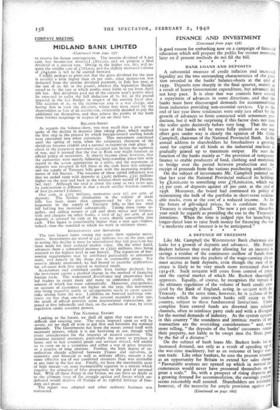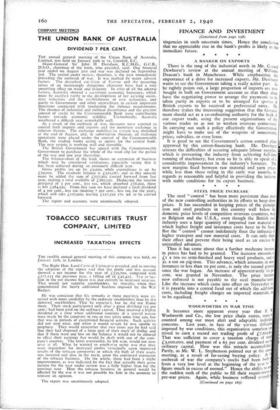A DEFENCE OF FREEDOM
Like Mr. Campbell the Westminster Bank chairman also looks for a growth of deposits and advances. Mr. Rupert Beckett believes that even after allowing for an increase in savings a residue of the continuous outflow of funds from the Government into the pockets of the wage-earning classes must accrue as bank deposits, even though the rate of in- crease is likely to be very much more restrained than in 1914-18. Such restraint will come from control of prices and the capital market of which Mr. Beckett thoroughly approves. Equally, of course, he recognises the virtues of the ultimate regulation of the volume of bank credit exer- cised by the Bank of England, acting in concert with the Treasury. At the same time, however, he is jealous of the freedom which the joint-stock banks still enjoy in this country, subject to these fundamental limitations. Under complete State control funds are diverted into selected channels, often to reinforce party ends and with a disregard for the normal demands of industry. As the system operates in this country "the soundness and intrinsic merits of any transaction are the overriding considerations" and, even more telling, "the deposits of the banks' customers remain their property, not liable to be swept into the State ptv by the fiat of a dictator."
On the subject of bank loans Mr. Beckett looks for an increased demand, not only as a result of speeding up of the war-time machinery, but as an outcome of larger over- seas trade. Like other bankers, he sees the present situation as an opportunity for Britain to extend her sales abroad. "Favourable avenues are opened up which in normal ch' cumstances would never have presented themselves on 93 great a scale." So, with a prospect of rising deposits and a growing demand for accommodation, the earnings position seems reasonably well assured. Shareholders are rem1ode4 however, of the necessity for ample provision against cen- (Continued on page 16o)
FINANCE AND INVESTMENT
(Continued from page 158) tingencies in such uncertain times. Hence the conclusion that no appreciable rise in the bank's profits is likely in the immediate future. * *







































 Previous page
Previous page